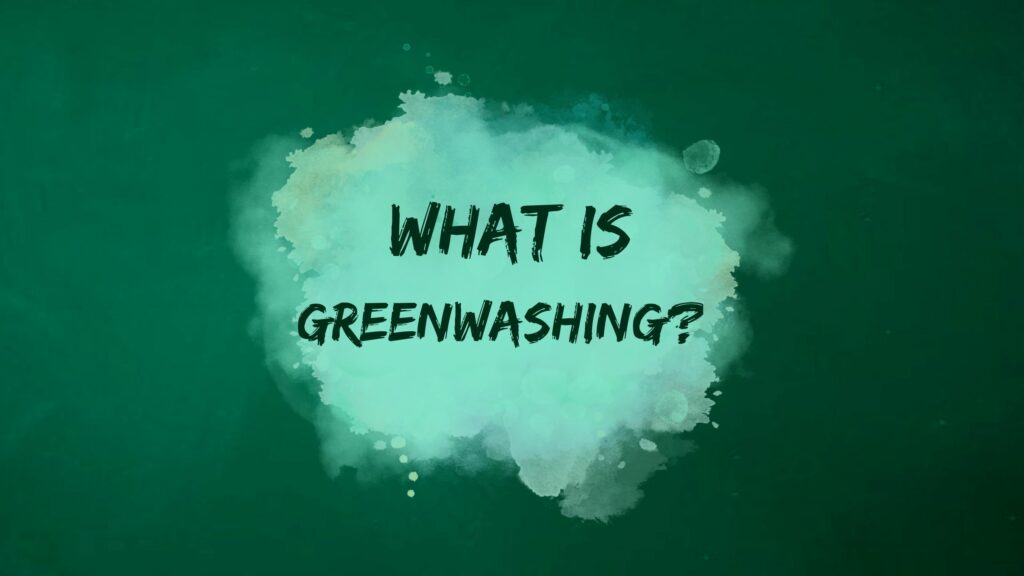You’ve probably heard the term if you are part of the natural living community, but what exactly does “greenwashing” mean?
In this article, we’ll dive into this popular term—defining it, but also expanding upon why we should care and how to truly shop ethically while honoring the planet. Environmentally-friendly companies are out there and need your support.
We will include common examples of greenwashing so you know how to spot greenwashing the next time you’re researching a brand.
Let’s get started!
What is Greenwashing?
Greenwashing is when a company makes very broad claims regarding their environmental commitment, monopolizing on a customer’s wish to support sustainable businesses with little or no basis. These companies know that customers wish to purchase ethical, eco-friendly products, so they twist their marketing language to serve their own agenda, attracting the consumer and painting an alluring picture that may not be totally truthful.
The term “greenwashing” was originally coined by Jay Westerveld in 1986, but has become incredibly relevant over the last decade as shoppers voice their concern about unethical manufacturing practices, toxic materials, wasteful packaging, pollution, & more.
What are Examples of Greenwashing?
Now that we’ve covered the overall greenwashing definition, here are some general greenwashing examples and terms you may see when shopping…
Using keywords like “natural” or “eco-friendly”
This is a common one since certain phrases can paint an earth-friendly picture without any regulations. For example, the phrase “certified organic” can only be used if the material or product is certified organic, but the word “organic” alone can be used in marketing in various ways, even if the material or product is not actually truly organic.
So, a bedding brand can have an ad campaign highlighting their sheets. It can include beautiful serene imagery in the background, with text such as “Embrace Mother Earth. Go Organic,” making consumers think that the product marketed is truly organic, but in actuality, only contains some organic cotton and then a blend of synthetic fibers.
Or let’s look at the term “all natural.” This is totally unregulated. Let’s say a campaign for a foundation states the cosmetic product is “made with all natural ingredients so you can organically glow from within.” Perhaps it includes a few “natural ingredients” that are safe and derived from plants, but then as you keep looking at the list, you notice toxic, chemical additives. So yes, it is “made with natural ingredients” but that doesn’t mean it is really ALL natural.
It’s all about playing with words, choosing ones that are popular and unregulated, and seeing if people notice. I don’t know about you, but that type of marketing seems highly problematic to us.
There is nothing wrong with brands using words like “organic” and “natural” on their own, but the product they are referencing should be primarily if not totally made of organic materials/ingredients. When a product is organic, companies will typically include a certification logo such as GOTS (Global Organic Textile Standard) that can be verified for authenticity with the regulatory agency via a database. Also look for a dedicated certifications page on the company’s website so customers can view the company’s certifications.
Using earth imagery
A brand can dress up an ad campaign with images of trees, flowers, waterfalls, forests, and wildlife to set the tone of a natural product without the product truly being natural. You can have a product with zero organic ingredients do this so it’s important to not get too distracted.
Perhaps a campaign for shampoo includes a quiet woodsy image in the ad, highlighting the notes of pine and cedar in the product. Maybe the name of the shampoo even has the word “organic” in the title. But make sure to check the ingredient list to see if it meets your standards before purchasing.
Eco-friendly promises
A company can make all sorts of claims about their vision and ways in which they are trying to decrease their carbon footprint or the amount of plastic they use. They can even try to steer your attention towards an environmentally positive change they’ve made such as introducing more cardboard packaging while hoping you don’t notice that there are toxic chemicals in their ingredient list.
Maybe they have made a donation to an environmental fund but meanwhile haven’t changed any of their manufacturing practices that is resulting in polluting our oceans.
Whatever the case may be, do your research. Maybe their pledge is genuine, or maybe it is an empty promise with dollar signs in mind.

Why Should Customers Care about Greenwashing?
Greenwashing takes away from the companies that are actually offering certified organic products, or promote ethical & environmentally-conscious manufacturing. It ignores the business leaders who spend a lot of time, energy, and money earning proper certifications for their materials or ingredients, and are meticulous about where they are sourcing these materials or ingredients from so that they know they are not only the best quality, but that they were made responsibly. This particularly affects small businesses that cannot keep up with the marketing campaigns of big players.
As more and more greenwashing companies are discovered, it also creates a sense of distrust in the commercial space, which was already present to begin with. Add in corporate greed with the facade of environmentalism, and you have a polluted shopping space where customers are asking: Which brands should I support?
It is unrealistic to state that any company is perfect. There is always room for improvement–whether that is in the ingredient list, the packaging, the supply chain, etc. But when in doubt, support small businesses with actions that backup their claims.
How to Solve Greenwashing
Well, unfortunately it’s easier said than done, and most of the work is currently on the consumer rather than through regulated terminology, which is unfair.
At the moment, the best thing to do is to invest in products from companies you think are doing the work. We always encourage supporting small businesses for many reasons, but one being that typically small businesses are not causing the large carbon footprint or heavy pollution through mass production that has negatively impacted the health of our planet.
Ask yourself what you are looking for in a brand, and make that known. Spread awareness about the unethical practices and promote those who are making a positive difference, whether through their products, their donations that are backed by other actions, or their business practices and values.
Look for transparency in the business realm, and ask questions when you are unsure.
And for business owners who are reading this: Evaluate your business. See where there is room for improvement, not in terms of increasing your revenue, but in terms of less waste, less pollution, and aiming for “certified organic” whenever possible for both the health of people and the planet.
